
Spanish Journal of Soil Science
Scope & Guideline
Empowering Global Collaboration in Soil Research
Introduction
Aims and Scopes
- Soil Ecology and Microbial Communities:
Research exploring the interactions between soil microorganisms and their environment, including how microbial communities influence soil health, nutrient cycling, and plant growth. - Soil Management and Agricultural Practices:
Studies examining the effects of various agricultural practices on soil properties, productivity, and sustainability, including the use of organic amendments and crop rotation. - Environmental Impacts and Soil Contamination:
Investigations into the effects of pollutants, such as heavy metals and antibiotics, on soil health and ecosystem functions. - Soil Restoration and Rehabilitation:
Research focused on methods and strategies for restoring degraded soils, particularly in the context of post-fire recovery and land management initiatives. - Soil and Climate Change Interactions:
Studies addressing how soil dynamics contribute to greenhouse gas emissions and carbon sequestration, particularly in the context of climate change and land use changes. - Educational Approaches in Soil Science:
Initiatives aimed at improving soil science education and awareness among students and the public, emphasizing the importance of soil in environmental sciences.
Trending and Emerging
- Impact of Climate Change on Soil Dynamics:
There is an increasing emphasis on understanding how climate change affects soil properties and processes, including studies on soil carbon dynamics and greenhouse gas emissions. - Soil Health and Sustainable Practices:
Research focusing on practices that enhance soil health, including the use of organic amendments and agroforestry systems, is gaining traction, highlighting the importance of sustainable agriculture. - Soil-Plant Interactions and Biostimulants:
A growing interest in the role of soil microorganisms and biostimulants in promoting plant growth and resilience, particularly in the context of drought and nutrient deficiencies. - Soil Contaminants and Remediation Techniques:
An uptick in studies addressing the presence and remediation of soil contaminants, such as pharmaceuticals and heavy metals, reflecting heightened awareness of soil pollution issues. - Community Involvement in Soil Management:
Emerging research highlights the importance of community engagement and participatory approaches in soil restoration and management, particularly in large-scale initiatives like the Great Green Wall.
Declining or Waning
- Historical Analysis of Soil Practices:
While historical analyses of soil management practices were once prominent, recent publications indicate a decline in this theme as the focus shifts towards current and future sustainability practices. - Traditional Knowledge in Soil Management:
Research addressing traditional and indigenous knowledge related to soil management has become less frequent, potentially overshadowed by more contemporary scientific approaches. - Single-Factor Agricultural Studies:
The focus on studies examining the effects of single agricultural practices on soil without considering broader ecological contexts appears to be waning, as there is a growing emphasis on integrated approaches.
Similar Journals
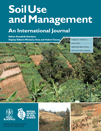
SOIL USE AND MANAGEMENT
Empowering the future of soil use and management.SOIL USE AND MANAGEMENT is a premier academic journal published by Wiley, focusing on the critical domains of Agronomy, Crop Science, Pollution, and Soil Science. With an ISSN of 0266-0032 and an E-ISSN of 1475-2743, the journal has established itself as a vital resource in the field since its inception in 1985. Operating from its U.S. headquarters in Hoboken, NJ, SOIL USE AND MANAGEMENT boasts impressive Q1 rankings across its relevant categories, indicating its standing in the top tier of research journals. Notably, it is ranked 48th out of 406 journals in Agronomy and Crop Science and holds an 88th percentile position, as well as a commendable rank of 26th out of 159 journals in Soil Science, underscoring its influence and reach. This journal serves as an essential platform for researchers, professionals, and students dedicated to sustainable soil management practices and understanding soil's role in agricultural productivity and environmental health. Although it does not offer Open Access, its rigorous peer-review process ensures the publication of high-quality original research, reviews, and case studies critical for advancing knowledge and practice in the field. This journal is crucial for anyone engaged in soil science and its related disciplines, encouraging innovative approaches to challenges facing soil use and management today.

Biochar
Transforming Sustainability Through Biochar InnovationWelcome to Biochar, an esteemed academic journal dedicated to the exploration and advancement of biochar technology and its applications across multiple fields. Published by SPRINGER SINGAPORE PTE LTD, this journal serves as a vital platform for disseminating high-quality research that addresses the critical intersection of environmental science, soil health, and sustainable materials development. With a commendable Q1 ranking in the fields of Biomaterials, Environmental Science, Pollution, and Soil Science, Biochar is recognized for its significant impact, as evidenced by its placement in the upper percentiles across various Scopus rankings. Researchers and professionals in agricultural and biological sciences will find valuable insights and innovative methodologies that promote sustainable practices and enhance soil quality. This journal, operating from its base in Germany, is committed to fostering a collaborative environment where cutting-edge research can inform policy and practice. Engage with us as we strive to advance the science of biochar from 2019 to 2024 and beyond.

Soil Ecology Letters
Championing Groundbreaking Discoveries in Soil ScienceSoil Ecology Letters, published by SpringerNature, is a premier journal dedicated to advancing the knowledge and understanding of soil ecosystems, their functions, and their vital role in global sustainability. Since its inception in 2019, this leading journal has consistently maintained its prestigious Q1 ranking in Ecology, Evolution, Behavior and Systematics, as well as Soil Science, reflecting its significant impact in the ecological and environmental sciences community. With an impressive Scopus ranking that places it within the top percentile of journals in its field, Soil Ecology Letters provides a platform for researchers and professionals to disseminate their groundbreaking findings. The journal is a vital resource for advancing research in agricultural and biological sciences, offering open access options that promote widespread dissemination of knowledge. With its focus on fostering collaboration and innovation in soil ecology, this journal is essential reading for anyone aiming to deepen their understanding of soil environments and their critical role in ecological health.
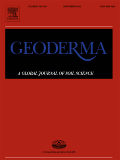
Geoderma
Transforming Soil Studies for Tomorrow's ChallengesGeoderma is a leading academic journal published by ELSEVIER, focused on the vital field of Soil Science. With an impressive impact factor and ranking as Q1 in its category for 2023, this journal stands as a prominent platform for researchers and professionals seeking to explore advanced scientific studies related to soil and its relationships with the ecosystem. Covering a wide range of topics from soil formation and characterization to land use and management practices, Geoderma is recognized for its rigorous peer-review process and is highly regarded within the global scientific community, as evidenced by its ranking of #12 out of 159 in the Scopus categories of Agricultural and Biological Sciences and Soil Science, placing it in the top 92nd percentile. With its inception dating back to 1967, the journal continually adapts and converges its content to meet the evolving demands of soil research until 2024 and beyond, providing invaluable insights for students, professionals, and researchers alike.
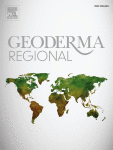
Geoderma Regional
Innovating research at the intersection of agriculture and biology.Geoderma Regional is a premier scholarly journal dedicated to advancing the field of Soil Science. Published by Elsevier in the Netherlands, this journal serves as a vital platform for disseminating high-quality, peer-reviewed research that spans the complexities of soil management, behavior, and the implications of soil processes on environmental sustainability. Since its inception in 2014, Geoderma Regional has achieved an impressive position within the academic community, holding a Q1 ranking in the field of Soil Science, placing it among the top 20% of journals in its category according to SCOPUS rankings. This journal is particularly distinguished for its significant contributions to the nexus between agriculture and biological sciences, reflected in its rank of #33 out of 159 in this field with a commendable 79th percentile. Researchers, professionals, and students alike will appreciate the journal's commitment to open discourse and innovative research agendas as it aspires to enhance our understanding of soil dynamics, addressing critical issues facing our planet.
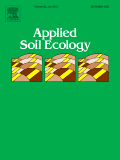
APPLIED SOIL ECOLOGY
Pioneering Research in Soil Biology and EcologyApplied Soil Ecology, published by Elsevier, is a premier journal dedicated to advancing the field of soil ecology through rigorous research and innovative methodologies. With an impressive impact factor and a consistent placement in the Q1 quartile across various categories including Agricultural and Biological Sciences, Ecology, and Soil Science, this journal underscores its significance in the scientific community. The journal's scope encompasses critical areas such as soil biology, microbial ecology, and the role of soils in ecosystem services, aiming to foster collaboration and knowledge exchange among researchers, professionals, and students. The convergence of research efforts from 1994 to 2024 highlights its commitment to maintaining current and relevant discourse within the field. While open access options are not available, the quality and depth of the articles published ensure that the latest findings and discussions are accessible through institutional subscriptions. With a strong focus on empirical studies and applied research, Applied Soil Ecology is an essential resource for anyone interested in the complexities of soil ecosystems and their impact on the environment.

Journal of Soil Science and Plant Nutrition
Exploring the vital connections between soil health and nutrition.The Journal of Soil Science and Plant Nutrition, published by SPRINGER INT PUBL AG, is a premier academic journal dedicated to advancing the fields of agronomy, plant science, and soil science. With an impressive Q1 ranking in both Agronomy and Crop Science and Plant Science, alongside a Q2 ranking in Soil Science, this journal stands at the forefront of innovative research and knowledge dissemination. Annually indexed in key databases, it provides a platform for high-quality research articles that explore the complex interactions between soil health and plant nutrition, contributing significantly to sustainable agricultural practices. Although it does not offer open access options, the journal is accessible through various academic institutions and libraries, ensuring a wide readership. With its emphasis on impactful findings, the journal is an essential resource for researchers, professionals, and students aiming to further their understanding and application of soil and plant science in an ever-evolving global context.
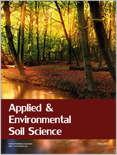
Applied and Environmental Soil Science
Pioneering research at the intersection of soil science and ecology.Applied and Environmental Soil Science, an esteemed journal published by HINDAWI LTD, focuses on disseminating high-quality research in the fields of soil science and environmental applications. With an ISSN of 1687-7667 and an E-ISSN of 1687-7675, this open-access journal has been a vital resource for the academic community since its inception in 2009. As of 2023, it holds a commendable position in the Q2 category for both Earth-Surface Processes and Soil Science, highlighting its impact in these crucial disciplines. The journal’s rankings further affirm its significance within the field, being placed 61st in Earth and Planetary Sciences and 58th in Agricultural and Biological Sciences. Researchers and practitioners alike benefit from the collaborative platform it offers for sharing innovative studies essential for sustainable soil management and environmental integrity. With a focus on advancing knowledge and fostering interdisciplinary dialogue, Applied and Environmental Soil Science stands as a crucial pillar for scholars and professionals dedicated to addressing the pressing challenges of soil and environmental health.
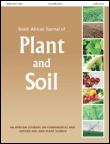
South African Journal of Plant and Soil
Pioneering insights into plant and soil management.South African Journal of Plant and Soil is an esteemed academic publication dedicated to advancing the fields of Ecology, Plant Science, and Soil Science. Published by TAYLOR & FRANCIS LTD in the United Kingdom, this journal has been a vital resource since its inception in 1984, providing a platform for innovative research and scholarly articles that address critical issues in plant and soil management. With a current impact factor placing it in the Q3 category according to the 2023 rankings, it occupies an influential position within the academic community, especially amongst researchers focused on agricultural and environmental sciences. Although not an open-access journal, it remains accessible to a broad audience through libraries and institutions that recognize its value in facilitating ecologically and environmentally focused discussions. The journal's ongoing commitment to publishing high-quality research ensures that it plays a pivotal role in nurturing knowledge and fostering advancements in sustainable practices across southern Africa and beyond.

CANADIAN JOURNAL OF SOIL SCIENCE
Exploring the Depths of Soil Science ExcellenceThe Canadian Journal of Soil Science (ISSN: 0008-4271, E-ISSN: 1918-1841) is a premier publication in the field of soil science, proudly published by Canadian Science Publishing. Established in 1974, this esteemed journal aims to promote high-quality research and insights into the dynamic interactions within soil ecosystems, addressing pressing issues such as soil health, management, and sustainability. With an impressive 2023 category quartile ranking of Q2 in Soil Science and a Scopus ranking placing it in the 52nd percentile, this journal stands out as a key resource for researchers, professionals, and students alike. Although currently not open access, the journal provides valuable content that contributes to advancing the understanding of soil science, an essential discipline for agricultural innovation and environmental stewardship. As we approach its converged years through 2024, the Canadian Journal of Soil Science is poised to continue its pivotal role in disseminating impactful research and fostering a community dedicated to soil science excellence.